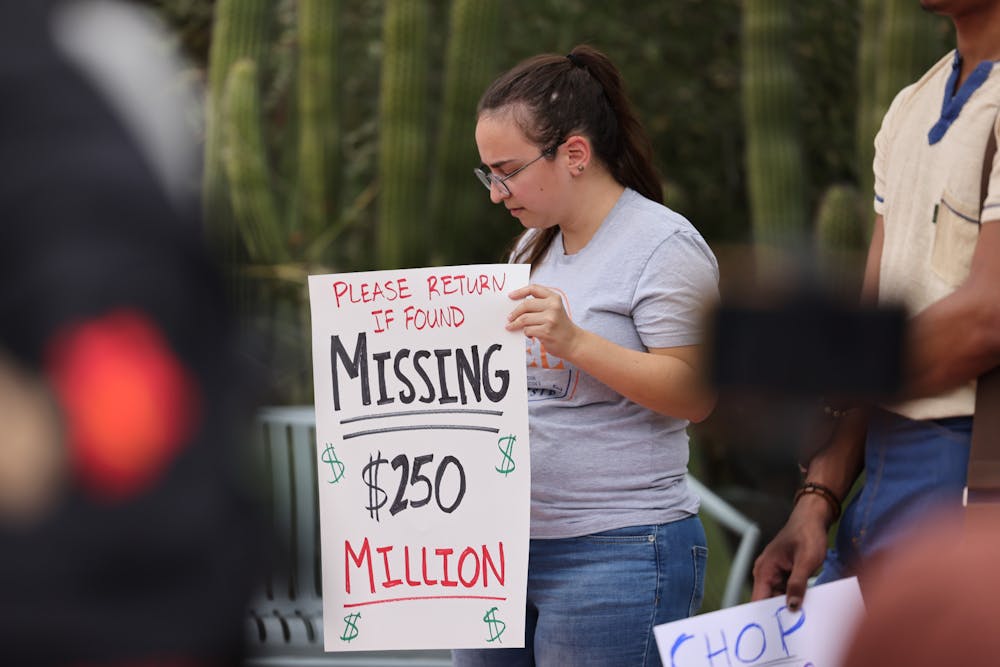The University of Arizona announced its action plan to address the ongoing financial crisis within the University in a virtual Arizona Board of Regents meeting on Dec. 13.
In the meeting, UA President Robert Robbins said the university would immediately freeze hiring and raises in compensation for employees. He also said the university is eliminating the tuition guarantee for new students starting in Fall 2025. That policy will not affect existing students.
He also said the University will take a "hard look" at merit aid for non-resident students and that access to merit aid will "likely" be reduced, which is another policy that will not affect current students. He said the university would not reduce needs-based aid to Arizona resident students. Still, earlier in the meeting, ABOR executive director John Arnold said ABOR will require additional budgetary controls on non-resident financial aid.
In the meeting, Robbins said the university is not instituting furloughs, reducing retirement benefits, or "jeopardizing our teaching and research missions."
"We make promises to our students, and we will keep those promises," Robbins said.
The meeting was held amid a financial crisis for UA. In November, the University announced it was $240 million short of cash on hand for the remainder of the fiscal year. The university attributed this to a miscalculation with an outdated financial model.
Read more: Students, faculty and officials voice concerns on University of Arizona's financial problems
Robbins also said he plans on balancing the University's athletics budget over the next few years by reviewing the price of tickets, maximizing media rights deals and philanthropy and consolidating administrative functions within UA. Arizona is joining ASU in its move to the Big 12 in 2024 and currently has the No. 1 ranked men's basketball team.
"I've said many times before (that) athletics is the most difficult part of the University's budget," Robbins said. "I also believe that athletics is a core part of the University of Arizona and a key element to our long-term success. I have had many great meetings with the athletics department, and we are committed to putting together a multi-year plan in place to bring their budget into balance."
ABOR and UA will also "centralize" the UA's budgets and require more financial reporting from the University for the next few years. Robbins said Arnold will also serve as the interim senior vice president of business affairs and chief financial officer at Arizona, replacing Lisa Rulney, who had served in the position since 2019. Arnold served as the state budget director for former Gov. Jan Brewer.
"I've had the pleasure of serving with John in higher education since I was named the president of the University of Arizona, and I admire deeply his integrity, leadership and effectiveness," Arnold said.
Read more: UA, ASU students hold protest, speak at ABOR meeting on financial crisis
Arnold proposed a four-step process at the meeting to lessen the present crisis. He said ABOR will require a "centralized" budgeting process and management of information technology. He also said UA will require additional financial reporting to better track cash flow, identify spending trends and compare revenues to expenditures more accurately to find problems more quickly.
Arnold recommended a peer review of financial reports from members of ABOR, ASU and NAU and suggested an annual summit of financial staff of ABOR, ASU, UA and NAU to interact on "best practices" financially.
"This review team process will not only provide the board with assurance that the required principles are being implemented correctly, it will better foster communication and learning between the three universities and the Board office," Arnold said in the meeting.
ABOR chair Fred DuVal said in the meeting that this is a "split-screen moment" for UA. He said UA has seen record-high levels of enrollment, research and philanthropy and wants to continue Arizona's positive momentum and growth throughout the budgetary and financial corrections.
"The financial issue is so significant the institution has erred over many years and over many presidents to properly manage its books," DuVal said. "But, I know you share this; regardless of how we got here together, we are going to fix it."
Robbins said one example of how UA has recently excelled has been student retention and said he does not want to "go backward" on that progress. UA enrolled over 40,000 undergraduates in Fall 2023 and over 10,000 graduate students. That is a 24.1% increase in undergraduate enrollment and a 34% increase in graduate students since Fall 2011. Robbins became President of UA in 2017.
Robbins said in the meeting that UA did not maintain balance and spending with university revenues, and he regrets that the university's largest investments have become associated with the current financial situation. However, he said he "firmly believes" in the principles that were put in place.
"As we right-size spending, we're going to have to look at what has worked, what is really moving the university forward and what has not worked," Robbins said. "Things that are not working will have to be abandoned."
Edited by Alysa Horton, Walker Smith and Angelina Steel.
Reach the reporter at sbrenna5@asu.edu and follow @shanebrennan71 on X.
Like The State Press on Facebook and follow @statepress on X.

Shane Brennan is the former Editor-in-Chief at The State Press and an ASU alum. He was a sports and politics reporter, before becoming the editor of the politics desk. He has covered local and state politics for the Arizona Capitol Times and Cronkite News.




